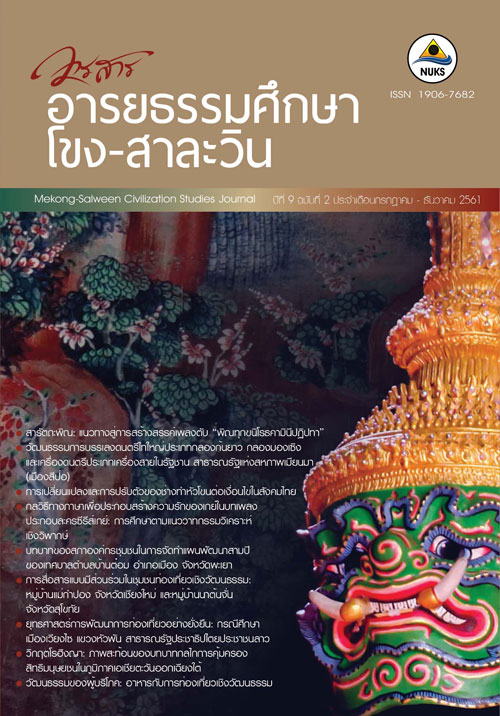Linguistic Strategies for Gay’s Love Construction in Thai Gay Series Songs: A Critical Discourse Analysis Study กลวิธีทางภาษาเพื่อประกอบสร้างความรักของเกย์ในบทเพลงประกอบละครซีรีย์เกย์: การศึกษาตามแนววาทกรรมวิเคราะห์เชิงวิพากษ์
Main Article Content
Abstract
This qualitative research aimed at studying Gay’s Love Construction through 4 Thai Gay Series’ songs produced between 2016 and 2017 by adopting Critical Discourse Analysis approach to analyze the texts. It was found that there were 10 linguistic strategies used by discourse producers as followings: Lexical selection, Rhetorical question, Metaphor, Presupposition manipulation, Presupposition denial, Sentence Pattern Repetition, Hyperbole, Verbal irony, Reasoning, and Tautology. These linguistic strategies indicated that the current gays’ love is to reveal the feelings to whom they love, and they expected that they are able to show their love the same way as man-female’s feeling. They, however under mentioned feelings, still have to conceal the love within only two people or specially secret groups because they struggled with their feelings and social obstacle. The present Gay’s Love Construction is different from in the past because not only they were always disappointed with love, but also they have no right to disclose their righteous feeling or opportunity to show love to whom they really adore openly.
Downloads
Article Details
References
Fairclough, N. (1989). Language and Power. London: Longman.
Hongladarom, K. (2008). Pragmatics. Bangkok: Faculty of Arts, Chulalongkorn University.
Hongladarom, K. and Eamanondh, J. (2006). Look at society through discourse. Bangkok: Chulalongkorn University.
Janks, H. (1997). Critical Discourse Analysis as a Research Tool. Discourse: studies in the cultural politics of education. Vol. 18.
Lakoff and Johnson. (1980). Metaphors We Live By. Chicago & London: The University of Chicago Press.
Naksing, P. (2012). Construction of gay identities in Thai Films. Bangkok: Journal of Social Sciences and Humanities (Thailand). 39 (2): 35 – 53.
Obpat, P. (2009, December). Thai language - Usage, Metaphor, Dharma (Buddhism). Bangkok: Journal of Thai Language and Literature. 26(1): 57-85.
Panpothong, N. (2012). Handout of Pragmatics Analysis of Thai. (revised edition). Bangkok: Department of Thai, Faculty of Arts, Chulalongkorn University.
Panpothong, N. (2013). Critical Discourse Analysis based on linguistics. Bangkok: Faculty of Arts, Chulalongkorn University.
Phanichtrakul, K. (2013). The Realationship between Language and Ideology of Male
Homosextuality in 2012. Master Thesis, M.A., Chulalongkorn University, Bangkok.
Phichitphongphao, S., (2010). Life Metaphor in How-To Books: A Study of the Relation between Language and Concepts. Master Thesis, M.A., Chulalongkorn University, Bangkok.
Potiwan, P. (2011). Social Movement of the Transgender. Retrieved October 1, 2017, from https://www.tci-thaijo.org/index.php/gskku/article/view/22555.
Royal Society of Thailand. (2010). Linguistics Dictionary (Applied Linguistics). Royal Society ofThailand version. Bangkok: Rungsilp Printing.
Soontravaravit, N. (2010). The Constructed Meaning and Identities of “Gays” in Real Space and Cyber Space. Master Thesis, M.A., Prince of Songkla Ubiversity, Songkla.
Thairatonline. (2014). Retrieved October 1, 2017, from https://www.thairath.co.th/content/451754.

